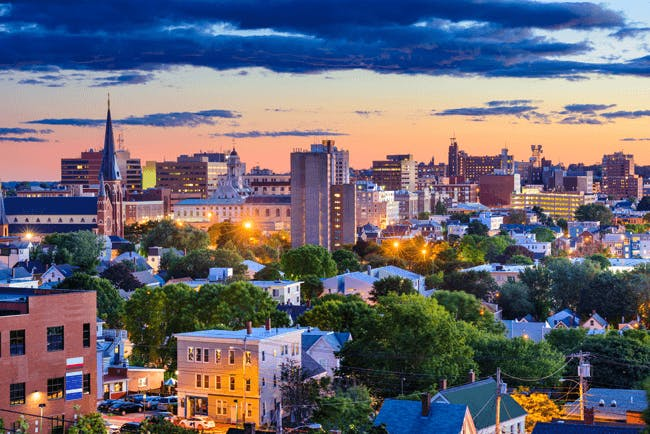
Apologies seafood haters. Maine residents are all about that bass, and they don’t want any trouble. (And a second apology to Meghan Trainor). That, and of course, some good ‘ol Maine lobster. Really, if you’re not into food that can be plucked out of murky waters, you might want to find a new place to live. But we’ll give Maine more credit than that. America’s most northern state of the lower 48, Maine is also among the least populated. Only 1.33 million people call Maine home. Given the state enjoys 35,000 acres of mostly-untapped wilderness, it might want to just yank West Virginia’s motto right from under its nose (“wild and wonderful”). And yes, there are lots of wild and wonderful things to do and see in this state, especially for those who call it home. But even a state as sparsely populated as Maine can have home security issues. Before you start boiling that next lobster, make sure you investigate whether home security in Maine is something you’ll want on the menu.
Home Security Provider Requirements for Maine
So what does crime look like in Maine? Pretty much the same as everywhere else. Although Maine has a noticeably better property crime rate than the rest of the U.S., its average still sits at around 20 instances per 1,000 people. Anyone living in Maine has a 1 in 50 chance of being a victim of a property crime — at least when you take the state as a whole. Maine’s low population density is only compounded by the fact that the state has no large cities.
Cities such as Portland, Lewiston, and Bangor might be large by Maine standards, but combined, these three only have populations totaling just over 135,000. For the number-hungry in the crowd, that’s a paltry 10% of the entire state’s population. For reference, Maine’s population is spread across more than 450 cities and towns. Given that property crime tends to increase when population density increases, you might be getting a clearer picture as to why this state’s average property crime rate is much lower than in most places. This holds true for the state’s largest city, Portland, where one’s chances of being a victim of property crime are 1 in 31. In the second largest city in the state, that number is 1 in 39. Population density, size, and crime go hand in hand.
Nevertheless, the overall lower property crime rates in Maine mean interesting things for the way the state operates its home security system rules and regulations. Or, more accurately, how they don’t. Maine has no known rules regulating home security providers on the state level. This is both unsurprising and common for many states, such as Louisiana and New Mexico. The only specific state-level regulation on the industry relates to electrical installation licensing requirements. Anyone who wants to install home security systems must have, at a minimum a “limited electrician’s license”.
For more specific rules and regulations on the industry, Maine residents should look directly to see if their city or town has passed any ordinances to that effect. Portland, for example, has an entire section of its city’s website dedicated to alarm systems. The city also has a specific, although short, permit application for alarm companies that involves a criminal background check. However, the real emphasis for Portland is related to preventing false alarms and ensuring residents and businesses have permits for their alarm systems.
Overall, don’t get your hopes too high that you’ll find any rules that regulate the industry in meaningful ways (such as hiring standards). All alarm companies in Maine must obtain business licenses, although the requirements for said business licenses can vary. Most have very minimal restrictions on companies. Is Maine a no man’s land as a result? Far from it. But you may want to see if your potential alarm company is a member of the Maine Burglar and Fire Alarm Association. If it’s not, you might want to look elsewhere.
Erecting Home Security Cameras
Considering the minimalist approach that Maine and its cities take to regulating the home security industry, you might want to invest in security cameras. But recording laws vary from place to place, so a bit of precaution is always good when stepping into the unknown.
Like pretty much every state in the U.S., Maine’s lawmakers don’t really care too much if you put up a home security camera or two (or three). What they do care about is what you choose to do with those cameras. Are you just going to use them to monitor activity in and around your home? Or are you going to gleefully point them at your neighbor’s house so you can get a peek at whatever it is they’re doing in there in the middle of the night? If you’re more into the latter, Maine has a problem with you.
Maine’s primary means of governing your home security system is their privacy law. The relevant part of that law is in section D:
“Engages in visual surveillance in a public place by means of mechanical or electronic equipment with the intent to observe or photograph, or record, amplify or broadcast an image of any portion of the body of another person present in that place when that portion of the body is in fact concealed from public view under clothing and a reasonable person would expect it to be safe from surveillance.”
Are you planning on doing such nefarious things with your security camera? No? Well, ok then! You’re good to go. But also, watch out for section B:
“Installs or uses in a private place without the consent of the person or persons entitled to privacy in that place, any device for observing, photographing, recording, amplifying or broadcasting sounds or events in that place;”
If you’re putting security cameras inside your home, and you have friends, family or guests who don’t know that those cameras are there, you could find yourself in trouble. Indoor security cameras should be left only in public places of the house, and you’ll want to make sure your guests know you have them. Otherwise, enjoy the secure home!
Safety During Natural Disasters
We’re going to assume that all of our readers know where Maine is located. With that assumption in mind, we’re also going to assume that our readers know what kind of weather is common in a state like Maine: snow. And lots of it! Maine is not only a fairly northern state, it is also rather mountainous, with areas that are well above sea level. We’re not talking Alaskan cold here, of course, but cold enough that any Florida residents will probably steer clear of Maine like it’s suffering from a zombie outbreak.
It almost goes without saying that major snowstorms are a common occurrence in Maine. But because Maine has a lot of coastlines and a lot of water, flooding is also a very common, very serious issue in the state. Winter weather can be bad, but most Maine residents know how to handle that. Flooding, however, is one natural disaster that many people, even those who live in flood zones, tend to not expect and not know how to handle correctly.
Surviving a flood requires a bit of foresight and some common knowledge. First, understand that you can’t and should not try to fight with nature on this one. You can beat a snow storm if you hunker down. You cannot beat a flood. It’s water in one of its most destructive forms. As we’ve seen in Louisiana, flooding can come quickly, unexpectedly, and take many people by surprise, to deadly consequences. So know, first hand, that if you live in an area where floods can happen, you need to prepare.
Prepare for a flood by making an escape plan. Where can you go? What roads around you might flood first, and what roads can you take that will reach to higher ground, fast? Make a note, or even a map of those areas. Keep an emergency kit handy as well. This should include standard emergency kit items: spare food, water, clothing, blankets, flashlight, radios, batteries. Make sure it’s just the bare essentials. There is no specific timer for how long it might take a flood to overtake your ability to escape it, but floods are always unpredictable. If you do find yourself still in your house when the flood comes, call 911 to let them know you are stuck, and then proceed to the highest place in your house. If the flood waters keep coming, get onto the top of your house if you can, bringing along items that are capable of floating. Most people don’t keep life jackets with them, but it may be a good idea to keep a few around just in case.
Staying safe in Maine is not too hard. While you may have to try a bit harder to locate a home security provider that’s worth your time, you can at least put up a few security cameras while you go through the vetting process. We also recommend going with a national home security company, as they will be bound by laws made in other states more strict than Maine. Just don’t give your home security companies too much grief. Perhaps boil them a lobster or two?

